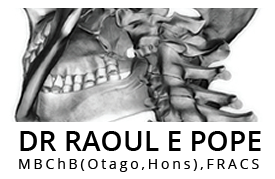Neck Pain
Most people will experience neck pain at some point in their lives. Neck pain can be acute, meaning it lasts a few hours to a few weeks, or it can be chronic. Neck pain that lasts several weeks or longer is considered chronic neck pain. Most causes of neck pain aren't serious. Poor posture at work, such as leaning into your computer, and during hobbies, such as hunching over your workbench, are common causes of neck pain. But sometimes neck pain can signify something more serious. If your neck pain is so severe that you can't touch your chin to your chest despite a few days of self-care, seek immediate medical attention.
Causes.
Neck pain can result from several causes, including:
Muscle strains.
Overuse, such as too much time spent hunched over a steering wheel, often triggers muscle strains. Neck muscles, particularly those in the back of your neck, become fatigued and eventually strained. When you overuse your neck muscles repeatedly, chronic pain can develop. Even such minor things as reading in bed or gritting your teeth can strain neck muscles.
Worn joints. Like the other joints in your body, your neck joints experience wear and tear with age, which can cause osteoarthritis in your neck. Neck (cervical) osteoarthritis can cause pain and stiffness in your neck.
Disc disorders. As you age, the cushioning discs between your vertebrae become dry and stiff, narrowing the spaces in your spinal column where the nerves come out. The discs in your neck also can herniate. This means the inner gelatinous cartilage material of a disc protrudes through the disc's tougher cartilage covering. Neck pain may occur or nearby nerves can be irritated. Other tissues and bony growths (spurs) also can press on your nerves as they exit your spinal cord, causing pain.
Infectious or Inflammatory. Disorders such as discitis (infection of the disc space), or epidural abscess (infection around the lining of the spinal cord) usually require specialist help. Disorders such as ankylosing spondylitis and fibromyalgia may need a Rheumatologist to advise treatment options.
Injuries. Rear-end collisions often result in whiplash injuries, which occur when the head is jerked forward and back, stretching the soft tissues of the neck beyond their limits.
Tumours. Spinal Tumours of the neck are rare but need to be excluded in any neck pain assessment. They can be primary (originate form the neck structures), or secondary (originate elsewhere and have spread to the neck). They can be benign (non-cancerous) or malignant (cancer).
When to seek medical advice
Neck pain doesn't always require medical care. Rarely, it can be a sign of an emergency.
When to try home care
Neck pain caused by muscle irritations is usually easy to self-diagnose, and it usually gets better on its own within a few of days.
This type of neck pain typically develops after excessive activity, a period of overuse or prolonged postures that put excessive strain on your neck muscles. If your neck pain doesn't let up within a week or two, see your doctor.
When to seek immediate medical care
See your doctor if the following signs and symptoms occur in conjunction with neck pain:
Severe pain from an injury. After head or neck trauma, such as whiplash or a blow to your head, see your doctor immediately. Severe pain over a bone might indicate a fracture or an injury to a ligament.
Shooting pain. Pain radiating to your shoulder, through your shoulder blades or down your arm, with or without numbness or tingling in your fingers, may indicate nerve irritation. Neck pain from nerve irritation can last from weeks to six months or longer. More sophisticated tests and treatments are available for this type of continued nerve irritation, so see your doctor.
Loss of strength. Weakness in an arm or a leg, walking with a stiff leg, or shuffling your feet indicates a possible neurological problem and needs immediate evaluation.
Change in bladder or bowel habits. Any significant change, especially a sudden onset of incontinence, could indicate a neurological problem.
Neck pain can be caused by injury, stress or by other health problems, including some that may have serious consequences. Follow this chart if you have been suffering from pain, stiffness, soreness or cramps in the neck. This is not intended to substitute a face to face consultation with a trained Medical Professional, but merely as a guide. Consult medical advice earlier than later.
Choose from the following headings to educate yourself what can cause Neck Pain:


